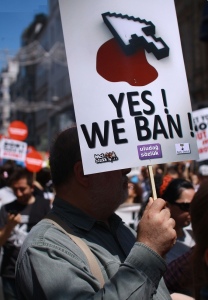Earlier this week, nearly all of the more than 77 million websites hosted by WordPress.com were inaccessible to the people of Turkey, due to broad and arbitrary censorship by the Turkish government. We began to hear reports of service outages during the evening of Monday, July 27, Istanbul time. The blocks were apparently removed by midday Wednesday, July 29.
 Citing Turkey’s 2007 Internet Law 5651, authorities sought to take down dozens of sites across the Internet they deemed objectionable. The list included five sites hosted on WordPress.com about Kurdish politics. Those sites were:
Citing Turkey’s 2007 Internet Law 5651, authorities sought to take down dozens of sites across the Internet they deemed objectionable. The list included five sites hosted on WordPress.com about Kurdish politics. Those sites were:
- http://peaceinkurdistancampaign.com
- http://pirtukxane.org/
- https://pkkonline.wordpress.com/
- https://rojbas1.wordpress.com/
- https://rojbas2.wordpress.com/
Turkey’s Information and Communication Technologies Authority provided WordPress.com with very minimal notice of their action against these sites. Within hours, before we had the chance to review their complaints much less respond, the government moved to block access. But because their order specified not just individual URLs but IP addresses as well, not only were the five targeted WordPress.com sites blocked, but so were the sites of countless nonpolitical bloggers, businesses, reporters, artists, and scientists who use WordPress.com.
A significant portion of the Internet went dark for the 75 million people of Turkey.
Once we learned of the outage, we worked to contact the authorities in Turkey, and had to adjust some of our IP addresses to make WordPress.com sites accessible. Eventually the Turkish government/ISPs chose to block only the specific sites, rather than everything on WordPress.com. Sites hosted on our platform are once again available in Turkey, except for the five listed above (though they remain accessible to visitors from outside of Turkey). We encourage Turkish readers interested in seeing what your government doesn’t want you to see to consider our suggestions for bypassing Internet restrictions.
In a similar case last week, Turkey also blocked access to Twitter in order to censor images of a deadly bombing and calls for protest.
We share our users’ frustration with this service outage, and we’re continuing to fight against internet censorship in Turkey.
In the near term, this means challenging the government order that led to our blocking — both on the principle that blocking an entire IP range is overly broad and never the right answer, as well as objecting to the inclusion of one of the sites on the government’s blacklist. PKKONLİNE was in fact railing against the PKK and violence, not supporting terrorist activities, as the statue cited in the government’s decision requires. Apparently these kinds of mistakes can be made when you hastily pull together a lengthy blacklist, based on largely superficial information. You can read a rough English translation of our appeal to the Turkish court here (pdf).
This week’s events show once again that whenever a government decides to censor the Internet, everybody loses — not just a regime’s targets but a whole nation — and it only serves to strengthen our resolve to resist censorship wherever we may find it.
Photo by Erdem Civelek of a 2011 protest for Internet freedom in Turkey. (CC BY 2.0)